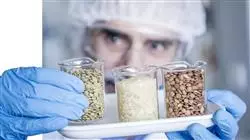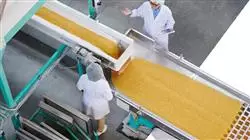University certificate
The world's largest faculty of nutrition”
Introduction to the Program
Ensure food safety with this Postgraduate certificate program in which you will identify risks in the food industry and become a highly qualified professional"

Risk Analysis in the Food Industry is a crucial discipline to ensure the safety of the food industry and to protect the health of consumers. It also allows to have a deeper control over the processes to be carried out during food production, thus ensuring the production of high quality products. With this in mind, the structure of this Postgraduate certificate program will allow the student to adopt all the necessary tools to excel in this field.
This will be possible thanks to the complete syllabus in which this program is structured and in which the student will acquire training on the most relevant elements to be taken into account in the evaluation of hazard factors. The different types of food hazards will also be studied, analyzing their origin, the reactions they cause and the mitigation measures to be applied to each one.
In addition, hazards of abiotic origin will be addressed, in order to identify them in a professional environment and act efficiently to counteract their effects. In this way, the trainee will be able to increase their professional skills and have the most appropriate competencies to meet the demands that exist in this sector today.
All this, thanks to the innovative Relearning methodology, which allows students to study from home and have greater time flexibility, since they will have access 24 hours a day to the multimedia resources they will find in the online campus. In addition, you will be able to strengthen your competencies and increase your ability to solve problems, since you will analyze practical cases that will place you in a real scenario.
Upgrade your practical skills in food industry risk management and increase your job prospects"
This Postgraduate certificate in Risk Analysis in the Food Industry contains the most complete and up-to-date scientific program on the market. The most important features include:
- The development of case studies presented by experts in Risk Analysis in the Food Industry
- The graphic, schematic, and practical contents with which they are created, provide scientific and practical information on the disciplines that are essential for professional practice
- Practical exercises where self-assessment can be used to improve learning
- Its special emphasis on innovative methodologies
- Theoretical lessons, questions to the expert, debate forums on controversial topics, and individual reflection assignments
- Content that is accessible from any fixed or portable device with an Internet connection
Face the challenges that exist in the area of food safety with confidence thanks to the knowledge you will acquire in this Postgraduate certificate"
The program’s teaching staff includes professionals from sector who contribute their work experience to this educational program, as well as renowned specialists from leading societies and prestigious universities.
Its multimedia content, developed with the latest educational technology, will provide the professional with situated and contextual learning, i.e., a simulated environment that will provide an immersive education programmed to learn in real situations.
The design of this program focuses on Problem-Based Learning, by means of which the professional must try to solve the different professional practice situations that are presented throughout the academic course. For this purpose, the student will be assisted by an innovative interactive video system created by renowned experts.
No need to comply with inflexible study schedules and the possibility of learning at your own pace are two benefits that this degree offers you"

Push your professional career towards excellence and become an expert in Risk Analysis, thanks to this 100% online program."
Why study at TECH?
TECH is the world’s largest online university. With an impressive catalog of more than 14,000 university programs available in 11 languages, it is positioned as a leader in employability, with a 99% job placement rate. In addition, it relies on an enormous faculty of more than 6,000 professors of the highest international renown.

Study at the world's largest online university and guarantee your professional success. The future starts at TECH”
The world’s best online university according to FORBES
The prestigious Forbes magazine, specialized in business and finance, has highlighted TECH as “the world's best online university” This is what they have recently stated in an article in their digital edition in which they echo the success story of this institution, “thanks to the academic offer it provides, the selection of its teaching staff, and an innovative learning method aimed at educating the professionals of the future”
A revolutionary study method, a cutting-edge faculty and a practical focus: the key to TECH's success.
The most complete study plans on the university scene
TECH offers the most complete study plans on the university scene, with syllabuses that cover fundamental concepts and, at the same time, the main scientific advances in their specific scientific areas. In addition, these programs are continuously being updated to guarantee students the academic vanguard and the most in-demand professional skills. In this way, the university's qualifications provide its graduates with a significant advantage to propel their careers to success.
TECH offers the most comprehensive and intensive study plans on the current university scene.
A world-class teaching staff
TECH's teaching staff is made up of more than 6,000 professors with the highest international recognition. Professors, researchers and top executives of multinational companies, including Isaiah Covington, performance coach of the Boston Celtics; Magda Romanska, principal investigator at Harvard MetaLAB; Ignacio Wistumba, chairman of the department of translational molecular pathology at MD Anderson Cancer Center; and D.W. Pine, creative director of TIME magazine, among others.
Internationally renowned experts, specialized in different branches of Health, Technology, Communication and Business, form part of the TECH faculty.
A unique learning method
TECH is the first university to use Relearning in all its programs. It is the best online learning methodology, accredited with international teaching quality certifications, provided by prestigious educational agencies. In addition, this disruptive educational model is complemented with the “Case Method”, thereby setting up a unique online teaching strategy. Innovative teaching resources are also implemented, including detailed videos, infographics and interactive summaries.
TECH combines Relearning and the Case Method in all its university programs to guarantee excellent theoretical and practical learning, studying whenever and wherever you want.
The world's largest online university
TECH is the world’s largest online university. We are the largest educational institution, with the best and widest online educational catalog, one hundred percent online and covering the vast majority of areas of knowledge. We offer a large selection of our own degrees and accredited online undergraduate and postgraduate degrees. In total, more than 14,000 university degrees, in eleven different languages, make us the largest educational largest in the world.
TECH has the world's most extensive catalog of academic and official programs, available in more than 11 languages.
Google Premier Partner
The American technology giant has awarded TECH the Google Google Premier Partner badge. This award, which is only available to 3% of the world's companies, highlights the efficient, flexible and tailored experience that this university provides to students. The recognition as a Google Premier Partner not only accredits the maximum rigor, performance and investment in TECH's digital infrastructures, but also places this university as one of the world's leading technology companies.
Google has positioned TECH in the top 3% of the world's most important technology companies by awarding it its Google Premier Partner badge.
The official online university of the NBA
TECH is the official online university of the NBA. Thanks to our agreement with the biggest league in basketball, we offer our students exclusive university programs, as well as a wide variety of educational resources focused on the business of the league and other areas of the sports industry. Each program is made up of a uniquely designed syllabus and features exceptional guest hosts: professionals with a distinguished sports background who will offer their expertise on the most relevant topics.
TECH has been selected by the NBA, the world's top basketball league, as its official online university.
The top-rated university by its students
Students have positioned TECH as the world's top-rated university on the main review websites, with a highest rating of 4.9 out of 5, obtained from more than 1,000 reviews. These results consolidate TECH as the benchmark university institution at an international level, reflecting the excellence and positive impact of its educational model.” reflecting the excellence and positive impact of its educational model.”
TECH is the world’s top-rated university by its students.
Leaders in employability
TECH has managed to become the leading university in employability. 99% of its students obtain jobs in the academic field they have studied, within one year of completing any of the university's programs. A similar number achieve immediate career enhancement. All this thanks to a study methodology that bases its effectiveness on the acquisition of practical skills, which are absolutely necessary for professional development.
99% of TECH graduates find a job within a year of completing their studies.
Postgraduate certificate in Risk Analysis in the Food Industry
The food industry is a key sector in the global economy, but it carries a number of risks that must be properly managed. The Postgraduate certificate in Risk Analysis in the Food Industry Postgraduate certificate focuses on the identification and assessment of risks associated with food production and marketing. Students will learn to apply risk analysis techniques to prevent the occurrence of foodborne diseases, ensuring food quality and safety.
The program focuses on the identification and assessment of risks associated with food production and marketing.
The program has a practical and experiential approach, so students will have the opportunity to apply theoretical concepts to real situations in the food industry. Topics covered in the course include allergen management, prevention of microbial contamination, food crisis management and implementation of quality management systems. Upon completion of the course, students will have a solid understanding of how to identify and assess risks in the food industry, and will be equipped with the tools necessary to implement effective risk management measures.
Postgraduate certificate.
Postgraduate certificate course in Risk Analysis in the Food Industry
The food industry is one of the most regulated and demanding sectors in terms of quality and safety. For this reason, it is essential that professionals working in this sector are trained to identify, assess and manage the risks associated with the production and marketing of food. The Postgraduate Certificate in Risk Analysis in the Food Industry Postgraduate Certificate provides students with the tools and knowledge necessary to carry out effective food risk management.
The Postgraduate Certificate in Food Industry Risk Analysis provides students with the tools and knowledge necessary to carry out effective food risk management.
The Postgraduate Certificate in Food Industry Risk Analysis provides students with the tools and knowledge necessary to carry out effective food risk management.
The program focuses on the application of risk analysis techniques and the implementation of food safety and quality management systems. Students will learn about foodborne illness prevention, allergen management, microbial contamination prevention and food crisis management. In addition, the course includes the application of national and international food safety rules and regulations. Upon completion of the course, students will be able to apply their knowledge and skills in practice, ensuring the quality and safety of food produced and marketed.
"







